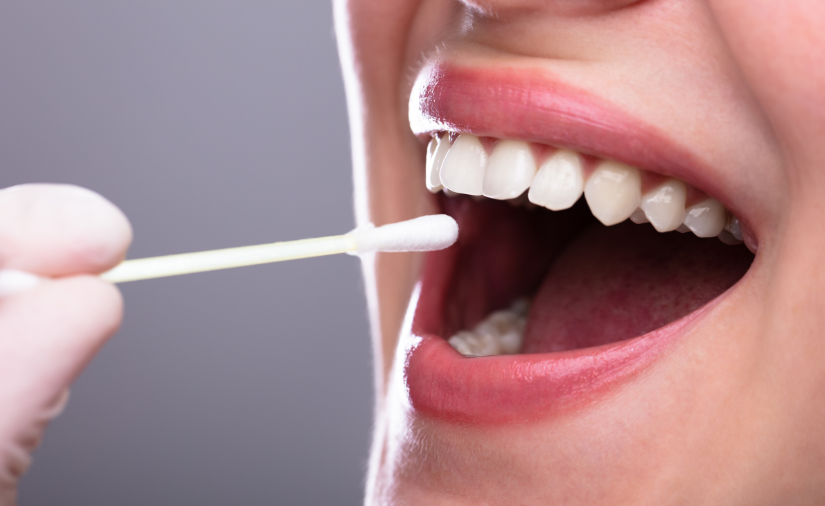By: Dr. Elizabeth Eggert
Saliva: you know, that stuff we normally call “spit.” While most people may cringe and call it “gross,” dentists know that saliva is actually a healthy mouth’s best friend!
Healthy saliva production is a good indicator that your oral health is in tip-top shape. On the other hand, if your saliva production or the consistency of your saliva is unusual, it may be a warning sign of some underlying conditions that need to be addressed.
What is Saliva?
Saliva is a clear liquid that’s created by your mouth 24 hours a day, seven days a week. Produced by the salivary glands, saliva keeps your mouth moist and comfortable, but it also performs a number of other important functions.
Within your saliva are tiny amounts of some very important substances, including mucus, proteins, minerals, electrolytes, antibacterial compounds and enzymes. These minerals and enzymes have a huge role to play when it comes to your overall health. For example, the enzyme amylase allows saliva to aid in digestion, by turning starches into sugars which your body can more easily absorb. Unsurprisingly, saliva also plays a key role in your oral health, protecting you from a host of dental problems.
3 Ways Saliva Protects Your Mouth
Apart from good dental health habits, when it comes to fighting off bacteria and disease in your mouth, consider saliva your superhero. From killing germs and preventing bad breath, to defending against gum disease and tooth decay, you can count on your saliva to save the day! But how does it do it?
- Every time you swallow, saliva sweeps away food and bacteria. This reduces the amount of bacteria in your mouth and neutralizes acids that would otherwise break down enamel and cause tooth decay.
- Saliva also contains antimicrobial agents that kill disease-causing bacteria. Without this daily “cleaning service,” you’d find that you’d develop gingivitis, gum disease, and other oral infections much faster.
- When acid does manage to damage tooth enamel, saliva actually repairs the tooth’s protective surface in a process called remineralization. Calcium, phosphorus, fluoride, and other minerals contained in saliva work together to coat and repair your enamel.
Saliva Symptoms and What They Mean
Aside from protecting your mouth, sometimes your saliva can be a key indicator that something is wrong in your body. Unusual production or consistency in your saliva can be a red flag to let you know that there’s a problem.
Not Enough Saliva
This is a condition known as dry mouth. Without enough saliva to coat your mouth, it can feel dry, sticky, and very uncomfortable. Dry mouth can be caused by a number of things, including:
- Dehydration
- Certain medications
- Medical treatments
- Diabetes
- Anemia
- Hypertension
…and more. Depending on the cause, dry mouth can be relieved by hydration, special oral rinses, medication to promote saliva production, and more.
Too Much Saliva:
Also known as hypersalivation, having too much saliva in your mouth can be just as uncomfortable as dry mouth. You may find yourself having to constantly spit or swallow throughout the day, which can even cause anxiety. Causes of hypersalivation include:
- Nausea
- Inability to swallow
- Inability to keep mouth closed
- Sinus or throat infections
- Ulcers, inflammation, or pain in the mouth
- Parkinson’s disease
…and more. In minor cases, hyper salivation can be treated at home with remedies such as brushing your teeth and using mouthwash to temporarily dry out the mouth. Hypersalivation can also be treated with medication, periodic botulinum toxin (Botox) injections, or in extreme cases, surgery.
Unusual Consistency
If your saliva is thick and opaque, that may be a sign that you have a yeast infection called oral thrush. This condition is more common in children and the elderly, and is treated with antifungal medications taken orally.
If your saliva is bloody, that may be an indication that you have developed gum disease. Bloody saliva will be most noticeable in the sink after brushing or flossing. If you think you have gum disease, call Eggert Family Dentistry and schedule an appointment right away. Treatments for gum disease include periodontal scaling and root planing.
Have Concerns About Your Saliva?
If you find that you’re producing excessive amounts of saliva, are experiencing bouts of dry mouth, or have noticed an unusual consistency in your saliva, call our office to schedule an appointment. Dr. Jeff Eggert or Dr. Elizabeth Eggert will be able to diagnose any problems and recommend or prescribe any treatments you may need. Call us today at 651-482-8412.

